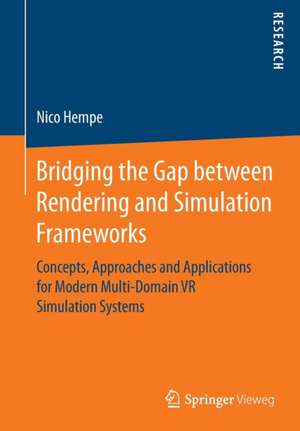Bridging the Gap between Rendering and Simulation Frameworks: Concepts, Approaches and Applications for Modern Multi-Domain VR Simulation Systems
Autor Nico Hempeen Limba Engleză Paperback – 16 iun 2016
Preț: 332.39 lei
Preț vechi: 415.49 lei
-20% Nou
Puncte Express: 499
Preț estimativ în valută:
63.62€ • 69.13$ • 53.48£
63.62€ • 69.13$ • 53.48£
Carte tipărită la comandă
Livrare economică 21 aprilie-05 mai
Preluare comenzi: 021 569.72.76
Specificații
ISBN-13: 9783658144005
ISBN-10: 3658144009
Pagini: 244
Ilustrații: XI, 244 p. 215 illus., 45 illus. in color.
Dimensiuni: 168 x 240 x 14 mm
Greutate: 0.42 kg
Ediția:1st ed. 2016
Editura: Springer Fachmedien Wiesbaden
Colecția Springer Vieweg
Locul publicării:Wiesbaden, Germany
ISBN-10: 3658144009
Pagini: 244
Ilustrații: XI, 244 p. 215 illus., 45 illus. in color.
Dimensiuni: 168 x 240 x 14 mm
Greutate: 0.42 kg
Ediția:1st ed. 2016
Editura: Springer Fachmedien Wiesbaden
Colecția Springer Vieweg
Locul publicării:Wiesbaden, Germany
Cuprins
Concepts of a Sustainable System Structure and a Modern Rendering Framework Based on a Central Semantic Database.- Rendering Techniques for Intuitive Data Visualizations and Optical Sensor Simulations.- A Broad Range of Practical eRobotics Applications.
Notă biografică
As team leader and lead developer at the Institute for Man-Machine Interaction at the RWTH Aachen University, Nico Hempe has many years of practical experience in the areas of Virtual Reality and 3D simulation systems. His research work focuses on real-time rendering, data visualization and sensor simulation.
Textul de pe ultima copertă
Taking into account aspects of semantic world models and graph databases, Nico Hempe presents concepts for a new class of modern Multi-Domain VR Simulation Systems based on the principles of the research field of eRobotics. Nico Hempe not only shows how to overcome structural differences between rendering and simulation frameworks to allow attractive and intuitive representations of the generated results, he also demonstrates ways to enable rendering-supported simulations. The outcome is an intuitive multi-purpose development tool for multiple applications, ranging from industrial domains over environmental scenarios up to space robotics.
Contents
As team leader and lead developer at the Institute for Man-Machine Interaction at the RWTH Aachen University, Nico Hempe has many years of practical experience in the areas of Virtual Reality and 3D simulation systems. His research work focuses on real-time rendering, data visualization and sensor simulation.
Contents
- Concepts of a Sustainable System Structure and a Modern Rendering Framework Based on a Central Semantic Database
- Rendering Techniques for Intuitive Data Visualizations and Optical Sensor Simulations
- A Broad Range of Practical eRobotics Applications
- Researchers and students of real-time computer graphics, robotics and sensors
- Practitioners in the area of Virtual Reality and 3D simulation systems
As team leader and lead developer at the Institute for Man-Machine Interaction at the RWTH Aachen University, Nico Hempe has many years of practical experience in the areas of Virtual Reality and 3D simulation systems. His research work focuses on real-time rendering, data visualization and sensor simulation.
Caracteristici
Study in Computer Science Includes supplementary material: sn.pub/extras













